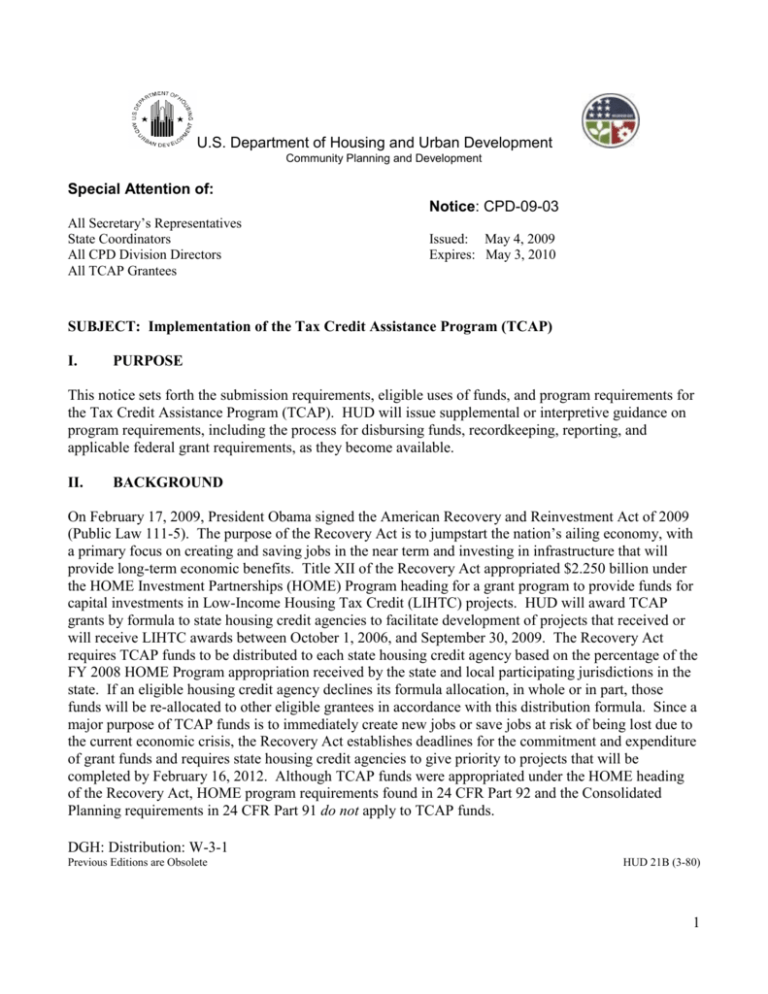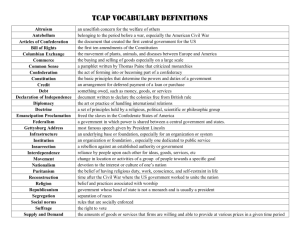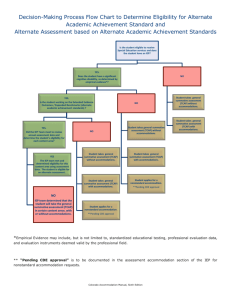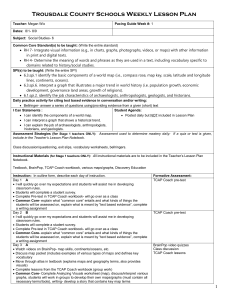Implementation of the Tax Credit Assistance Program (TCAP)
advertisement

U.S. Department of Housing and Urban Development Community Planning and Development Special Attention of: Notice: CPD-09-03 All Secretary’s Representatives State Coordinators All CPD Division Directors All TCAP Grantees Issued: May 4, 2009 Expires: May 3, 2010 SUBJECT: Implementation of the Tax Credit Assistance Program (TCAP) I. PURPOSE This notice sets forth the submission requirements, eligible uses of funds, and program requirements for the Tax Credit Assistance Program (TCAP). HUD will issue supplemental or interpretive guidance on program requirements, including the process for disbursing funds, recordkeeping, reporting, and applicable federal grant requirements, as they become available. II. BACKGROUND On February 17, 2009, President Obama signed the American Recovery and Reinvestment Act of 2009 (Public Law 111-5). The purpose of the Recovery Act is to jumpstart the nation’s ailing economy, with a primary focus on creating and saving jobs in the near term and investing in infrastructure that will provide long-term economic benefits. Title XII of the Recovery Act appropriated $2.250 billion under the HOME Investment Partnerships (HOME) Program heading for a grant program to provide funds for capital investments in Low-Income Housing Tax Credit (LIHTC) projects. HUD will award TCAP grants by formula to state housing credit agencies to facilitate development of projects that received or will receive LIHTC awards between October 1, 2006, and September 30, 2009. The Recovery Act requires TCAP funds to be distributed to each state housing credit agency based on the percentage of the FY 2008 HOME Program appropriation received by the state and local participating jurisdictions in the state. If an eligible housing credit agency declines its formula allocation, in whole or in part, those funds will be re-allocated to other eligible grantees in accordance with this distribution formula. Since a major purpose of TCAP funds is to immediately create new jobs or save jobs at risk of being lost due to the current economic crisis, the Recovery Act establishes deadlines for the commitment and expenditure of grant funds and requires state housing credit agencies to give priority to projects that will be completed by February 16, 2012. Although TCAP funds were appropriated under the HOME heading of the Recovery Act, HOME program requirements found in 24 CFR Part 92 and the Consolidated Planning requirements in 24 CFR Part 91 do not apply to TCAP funds. DGH: Distribution: W-3-1 Previous Editions are Obsolete HUD 21B (3-80) 1 III. TCAP SUBMISSION REQUIREMENTS AND GRANT AGREEMENTS Submission Requirements After reviewing the requirements put forth in this Notice, any state housing credit agency interested in accepting all or a portion of its TCAP allocation must submit the following information within 30 days of the publication date of this Notice. Any state housing credit agency which fails to submit the required TCAP Submission Packet will be considered to have declined the receipt of its entire TCAP formula allocation. HUD will not award funds to any state housing credit agency that has not provided the following information: A. Statement of intent to accept TCAP funds, which must include: 1) A statement that indicates whether the grantee intends to accept the entire amount of its TCAP formula allocation. If the state housing credit agency elects to receive less than the full formula amount, the statement should provide the exact amount of TCAP funds that it will accept. Once HUD determines that the submission packet is complete, the amount requested by the grantee cannot be changed; 2) A statement detailing which, if any, other federal grant funds the state housing credit agency currently administers (LIHTCs are not federal grant funds); 3) A statement regarding the status of its 2009 LIHTC allocation process; and 4) The name and contact information, including email address, phone and fax number, of the individual designated as the agency contact for TCAP. B. Description of Competitive Selection Criteria: As described below, the grantee must distribute the TCAP funds competitively under the requirements of the Recovery Act (i.e., give priority to projects that are expected to be completed by February 16, 2012) and pursuant to the existing Qualified Allocation Plan (QAP). Each state housing credit agency must submit a written description of all the selection criteria and any weightings assigned that it will use to competitively award its TCAP funds. The state housing credit agency must also define an “award of LIHTCs” which can be as early as the date of public notice of the funding decision for a particular project. The same definition of an “award of LIHTCs” must be uniformly applied to all LIHTC projects for the purpose of determining project eligibility for TCAP funding. C. Commitment and Expenditure Deadlines: Each state housing credit agency must describe the procedures it will use to ensure it will commit and expend its TCAP funds to meet the deadlines established in the Recovery Act (see below). In addition, it must specifically describe how it will redistribute funds to more deserving projects from projects which are not in compliance with deadlines established in the written agreement between the grantee and project owners. 2 D. Recovery Act Accountability and Transparency Requirements: Each state housing credit agency must submit information about how it is meeting the Recovery Act accountability and transparency requirements (see below). To implement this requirement, the state housing credit agency must make its project selection process and criteria available to the public and accept comments from the public for a period of not less than five days. The state housing credit agency must submit to HUD its website address set up for this purpose, and a description of how it met the five-day comment period. It must also provide a description of how the agency plans to ensure that it will remain in compliance with these accountability and transparency requirements for the duration of the TCAP grant. E. Additional Elements of the Submission: Each state housing credit agency must submit Standard Form 424 (Application for Funds) signed by a legally authorized representative of the agency. Among other identifying data elements, the form requires all potential grant recipients to have a Data Universal Numbering System (DUNS) number from Dun and Bradstreet. Grantees eligible for TCAP funds should determine if they have a DUNS number and, if not, request one as soon as possible. Organizations can receive a DUNS number at no cost by calling the dedicated toll-free DUNS Number request line at 1–866– 705– 5711. A sample SF-424 is attached to this Notice. The Recovery Act also requires registration in the Central Contractor Registration (CCR). To register, go to www.ccr.gov/startregistration.aspx. The TCAP Submission must include a transmittal letter on the letterhead of the state housing credit agency and signed by the Chief Executive Officer or Chief Operating Officer of the agency. F. Deadline for Submissions: State housing credit agencies must send three copies of the Submission Requirements packet by Federal Express or United Parcel Service, within 30 days of the publication of this Notice, to Marcia Sigal, Director, Program Policy Division, Office of Affordable Housing Programs, Community Planning and Development, U.S. Department of Housing and Urban Development, 451 7th St., S.W. Room 7164, Washington, D.C. 20410. The submission deadline will be met if the Submission Requirements packet is sent by overnight or express delivery and is placed in transit with Federal Express or UPS on or before 30 days from the publication date of this Notice. Due to security screening procedures, submissions sent by regular U.S. Postal Service mail may not be received timely. Fax and email transmissions will not be accepted. HUD will fund only those state housing credit agencies that provide complete TCAP Submission Requirements packets. HUD will review each TCAP Submission packet for completeness within 10 days of receipt and notify any state housing credit agency if it is found to be incomplete and provide instructions for curing the deficiency. 3 Grant Agreements After HUD determines that the grantee’s TCAP submission is complete, HUD will execute a grant agreement with the state housing credit agency. The grant agreement will include all applicable requirements specific to the TCAP program, federal grant requirements and reporting requirements required by the Recovery Act. In accordance with 24 CFR 85.12, if HUD determines that a grantee has a history of unsatisfactory performance, is not financially stable or has a management system that does not meet management standards set forth in 24 CFR Part 85, HUD may declare the grantee as “high risk” and attach special conditions to the grant agreement. IV. TCAP PROGRAM REQUIREMENTS Although TCAP funds were appropriated under the HOME Program heading of the Recovery Act, HOME statutory and regulatory requirements do not apply to TCAP funds, with the exception of environmental review requirements discussed below. The Recovery Act establishes certain requirements applicable to the TCAP program, including deadlines for commitment and expenditure, transparency, and distribution of funds. This Notice sets forth these requirements. Other federal laws, such as Fair Housing, apply by their own terms. HUD will issue guidance, including frequently asked questions on TCAP requirements, on a continuing basis, to facilitate project implementation and compliance with TCAP requirements. A. Eligible Grantees, Projects and Uses of Funds Grantees: The housing credit agency of each of the 50 states, the District of Columbia, and the Commonwealth of Puerto Rico are the only eligible grantees for the TCAP program. These agencies are referred to collectively as either state housing credit agencies or grantees in this notice. Eligible Projects: By statute, projects eligible to receive TCAP assistance are rental housing projects that received or will receive an award of LIHTCs under Section 42(h) of the Internal Revenue Code of 1986, as amended, (IRC) (26 U.S.C. 42), during the period from October 1, 2006 to September 30, 2009 (federal fiscal years 2007, 2008 or 2009), and require additional funding to be completed and placed into service in accordance with the requirements of Section 42 of the IRC. Projects awarded LIHTCs that will also receive bond financing are eligible to receive TCAP funds. However, if the only source of credits for a project is the Gulf Opportunity Zone or Midwestern Disaster Area Housing Credits, it is not an eligible TCAP project since these credits were not awarded under Section 42(h) of the IRC. The state housing credit agency must also define an “award of LIHTCs” which can be as early as the date of public notice of the funding decision for a particular project. The same definition of “award of LIHTCs” must be uniformly applied to all LIHTC projects for the purpose of determining project eligibility for TCAP funding. 4 Eligible uses of funds: TCAP funds may be used for capital investment in eligible LIHTC projects. Capital investment means costs that are included in the ‘eligible basis’ of a project under Section 42 of the IRC. TCAP funds cannot be used for the administrative costs of TCAP grantees, including the cost of operating the program or monitoring compliance, and section 1604 of the Recovery Act specifically prohibits the use of grant funds for swimming pools. The TCAP assistance provided to a project must be made in the same manner and subject to the same limitations (including rent, income, use restrictions and compliance monitoring) as required by the state housing credit agency with respect to an award of LIHTC to a project (i.e., as required under Section 42 of the IRC and its implementing regulations), and all other requirements of the Act. B. TCAP Fund Distribution The Recovery Act requires HUD to distribute TCAP funds to each state housing credit agency based on the percentage of the FY 2008 HOME Program appropriation received by the state and local HOME participating jurisdictions in the state. Following the submission and HUD’s acceptance of the materials described in above, HUD will execute a grant agreement with each grantee. The grantee may then proceed with the distribution of its TCAP funds in accordance with this Notice and the Recovery Act requirements. The Recovery Act requires grantees to distribute TCAP funds “competitively under this heading and pursuant to their qualified allocation plan”, as defined in Section 42(m) of the IRC. The TCAP competition is limited to projects that have received or will simultaneously with TCAP funding receive a LIHTC award between October 1, 2006 and September 30, 2009 (federal fiscal years 2007, 2008, or 2009). Note that state housing credit agencies are neither required nor expected to amend their QAPs to comply with this program requirement. In states in which there are multiple housing credit agencies, a project may be selected pursuant to any housing credit agency’s qualified allocation plan (QAP). The TCAP grantee may also choose to sub-grant a portion of its TCAP grant to another housing credit agency within the state. The sub-grant agreement must contain all applicable TCAP and Federal grant requirements. In their competitive TCAP selection process, state housing credit agencies are required to give priority to eligible projects that are expected to be completed within 3 years from the date of Recovery Act enactment (February 16, 2012). Consequently, this standard must be the main selection criterion in any TCAP competition. The grantee is otherwise free to design its competitive process and adopt any other selection criteria it chooses. For example, a grantee may choose to award TCAP funds to projects that: (1) meet a predetermined threshold of “readyto-go”; and (2) have completed the required environmental review process (described below) because the project had already been awarded HOME or other federal financial assistance. The grantee can also decide whether to provide TCAP funds to eligible projects through grants or loans. Each grantee should consider how these decisions, in the aggregate, may affect its ability to meet the statutory deadlines for commitment and expenditure of funds defined below. For example, if TCAP funds are provided to projects as loans, any repayment of principal or interest received during the three-year grant period is program income and must be expended before appropriated TCAP funds. (See below for a discussion of TCAP program income.) 5 Pursuant to the Recovery Act, the state housing credit agency’s selection process must be ‘transparent’, as described below. C. TCAP Commitment and Expenditure Deadlines The Recovery Act imposes both commitment and expenditure deadlines on the grantee’s use of TCAP funds. Specifically, the Recovery Act requires that the state housing credit agency: Commit not less than 75 percent of its TCAP grant within one year of the enactment of the Recovery Act (i.e., by February 16, 2010); Demonstrate that all project owners have expended 75 percent of the TCAP funds within two years of the enactment of the Recovery Act (i.e., by February 16, 2011); and Expend 100 percent of its TCAP grant within three years of the enactment of the Recovery Act (i.e., by February 16, 2012). The grantee must track and report to HUD on a regular basis in IDIS its progress in committing and expending TCAP formula grant funds. Grant funds not expended by the end of the threeyear performance period will be recaptured by HUD. A TCAP Funding Commitment is recorded on the date of execution of the written agreement between the grantee and project owner that provides TCAP assistance to a project. (See Section IV.B. for additional information on the written agreement.) Expenditure means a charge against the TCAP program funds account. Expenditures may be reported on a cash or accrual basis. D. TCAP Written Agreements and Disbursements Written Agreements -- Grantees must execute a legally binding written agreement with each project owner. The written agreement, called a TCAP written agreement, must set forth all of the TCAP program and crosscutting federal grant requirements applicable to the funding, and must make these requirements enforceable through the recordation of a restriction that is binding on all owners and successors, e.g., a covenant. HUD will issue more specific guidance on the required content of a TCAP written agreement. The written agreement for a project cannot be executed until environmental clearance for the project is completed and the Request for Release of Funds (RROF) is approved. The grantee must retain a copy of the executed TCAP written agreement and make these agreements available for HUD review, upon request. Disbursement of Funds -- The TCAP written agreement must be signed and dated by the grantee and project owner before any TCAP funds are disbursed. Federal funds cannot be drawn from the U.S. Treasury in advance of the need to pay an eligible cost. Consequently, TCAP funds cannot be drawn from the U.S. Treasury and placed in escrow or advanced in lump sums to project owners. Once funds are drawn from the grantee’s U.S. Treasury account, they must be expended for an eligible TCAP cost within 3 days. 6 E. Program Income Program Income -- means gross income received by the grantee generated by the use of TCAP funds during the grant period. This includes, but is not limited to, principal and interest from a loan made with TCAP funds, or other income or fees received from project owners in connection with TCAP funds, and interest earned by the grantee on program income before its disposition. The grantee must record program income receipts in HUD’s Integrated Disbursement and Information System (IDIS) and use them in accordance with the TCAP requirements. The grantee must expend all program income for eligible TCAP costs before additional appropriated TCAP grant funds are drawn from the U.S. Department of Treasury. Grantees must continually monitor the amount of program income on-hand or anticipated, and be aware of these amounts when assessing their progress towards meeting the commitments and expenditure deadlines for TCAP funds. F. The Recovery Act Accountability, Transparency and Reporting Requirements The Recovery Act imposes significant accountability, transparency and reporting requirements for each program and expenditure under the Act, some of which are still being defined by the Office of Management and Budget (OMB). HUD will incorporate the final requirements into the TCAP grant agreement. On February 18, 2009, OMB issued initial guidance on the implementation of Recovery Act programs, including initial reporting requirements for recipients of Recovery Act funding. All recipients of Recovery Act funds, including TCAP grantees, will be required to report to HUD, 10 days after the end of each calendar quarter starting on June 10th, 2009, information similar to the following: The total amount of TAP funds received; The amount of TCAP funds expended or obligated to projects or activities, including unobligated balances; A detailed list of all projects or activities for which TCAP funds were expended or obligated, including: The name of the project, A description of the project, An evaluation of the completion status of the project, and An estimate of the number of jobs created and the number of jobs retained by the project. The Recovery Act imposes additional transparency and reporting requirements for TCAP. Each state housing credit agency must post on its website a description of its competitive selection criteria for awarding TCAP funds to eligible projects. In addition, the grantee must identify all projects selected for funding, and post the amount of each TCAP award on its website. TCAP grantees must submit reports in a format and at such time as prescribed by HUD. In addition, HUD and Office of the Inspector General (OIG) staff must be given access, upon reasonable notice, to all information related to the selection, award and use of TCAP funds. 7 G. Asset Management The Recovery Act requires state housing credit agencies to perform asset management functions, or contract for performance of these services, at the owner’s expense, to ensure compliance with Section 42 of the IRC and the long term viability of projects funded by TCAP. Costs associated with asset management are administrative costs and are not eligible to be paid with TCAP funds. H. Redistribution of TCAP Funds The grantee is responsible for redistributing its TCAP funds to ensure compliance with the commitment and expenditure deadlines established by the Recovery Act. If a project owner fails to expend TCAP funds timely, the grantee must assess whether the delay will affect its ability to meet its TCAP deadlines, and take necessary steps to redistribute the funds to a more deserving project. Consequently, in the TCAP written agreement, the grantee must specify a schedule for the expenditure of TCAP funds and outline the circumstances under which TCAP funds will be recaptured if the project owner fails to meet the schedule. The grantee must closely monitor the progress of each TCAP project to ensure that it will meet TCAP expenditure deadlines, since failure to do so will result in recapture of funds by HUD. V. FEDERAL GRANT REQUIREMENTS TCAP funds are federal financial assistance and, therefore, are subject to requirements applicable to such funds. Grantees must comply with the following federal requirements: Fair Housing Act (42 U.S.C. 3601-19) and implementing regulations at 24 CFR Part 100 and the regulations at 24 CFR Part 107 (Equal Opportunity in Housing). Title VI of the Civil Rights Act of 1964 (42 U.S.C. 2000(d)) (Nondiscrimination in Federally Assisted Programs) and implementing regulations at 24 CFR Part 1. The Age Discrimination Act of 1975 (42 U.S.C. 6101-07) and implementing regulations at 24 CFR Part 146 “Nondiscrimination on the Basis of Age in HUD Programs or Activities Receiving Federal Financial Assistance.” Affirmatively Furthering Fair Housing HUD has responsibility to affirmatively further fair housing in the programs it administers. To meet this obligation, each TCAP grantee must establish an affirmative fair housing marketing plan for its TCAP projects and require project owners to follow its plan when marketing TCAP units. Affirmative marketing steps consist of actions to provide information and otherwise attract eligible persons in the housing market to the available housing without regard to race, color, national origin, sex, religion, familial status or disability. The affirmative marketing requirements and procedures adopted must include: Methods for informing the public, owners and potential tenants about Federal fair housing laws and the grantee’s affirmative marketing policy: 8 Requirements and practices each owner must adhere to in order to carry out the grantee’s affirmative marketing procedures and requirements; Procedures to be used by owners to inform and solicit applications from persons in the housing market areas that are not likely to apply for the housing without special outreach. Special outreach, as appropriate, includes but is not limited to, the translation of marketing material for persons who are limited English proficient; the placement of translated marketing material in minority owned media; and the provision of meaningful access concerning the residential rental project (e.g. providing translated information about application procedures, tenancy and other project amenities); Records that will be kept describing actions taken by the grantee and by owners to affirmatively market units and records to assess the results of these actions; and A description of how the grantee will annually assess the success of affirmative marketing actions and what corrective actions will be taken where affirmative marketing requirements are not met. Section 504 of the Rehabilitation Act of 1973 (29 U.S.C. 794) and implementing regulations at 24 CFR Part 8 “Nondiscrimination Based on Handicap in Federally Assisted Programs and Activities of the Department of Housing and Urban Development.” Section 504 of the Rehabilitation Act of 1973 applies to all TCAP projects. For new construction projects and projects undergoing substantial rehabilitation, five percent of the units must be accessible to persons with mobility impairments and two percent of the units must be accessible to persons with hearing or vision impairments (See 24 CFR 8.22.) Substantial rehabilitation for a multifamily rental project is defined in Section 24 CFR 8.23 as a project with 15 or more units for which the alterations would equal more than 75 percent of the replacement cost for the facility. Modifications to projects to comply with Section 504 requirements are eligible costs under TCAP. However, compliance with Section 504 requirements may be infeasible or impracticable for some projects, depending on where they are in the development process. If a new construction or substantial rehabilitation project is underway or has already been completed, and it cannot be modified to meet the accessibility requirements established by Section 504, it is ineligible to receive TCAP assistance. For projects in which the rehabilitation would not be considered substantial, the Section 504 provisions are applicable only to the maximum extent feasible, i.e., not required if it would impose undue financial and administrative burden. See 24 CFR 8.23. National Environmental Policy Act and Related Laws (Environmental review responsibilities) and implementing regulations at 24 CFR Part 58. Some state housing credit agencies and LIHTC owners may be unfamiliar with the NEPA requirements and the significant impact that the timing of certain decisions or actions may have on their ability to award TCAP funds. The Recovery Act expressly applies section 288 of the HOME 9 statute, which requires the State to assume responsibility for environmental review under the National Environmental Policy Act (NEPA) of 1969 and related federal environmental authorities and regulations at 24 CFR Part 58 “Environmental Review Procedures for Entities Assuming HUD Environmental Responsibilities.” The “State”, as defined in the HOME program statute (42 USC 12704(2)), means “any State of the United States, the District of Columbia, the Commonwealth of Puerto Rico, or any agency or instrumentality thereof that is established pursuant to legislation and designated by the chief executive officer to act on behalf of the State with regard to the provisions of this Act.” Accordingly, the State is responsible for the environmental review, but the State may designate, if it so chooses, the state housing credit agency to perform the environmental reviews for TCAP projects on behalf of the State. No TCAP funds may be committed to a project before completion of the environmental review process. Once an owner applies for TCAP funds, committing TCAP or any other funds to or undertaking any “choice-limiting” activity prior to successful completion of the environmental clearance review (i.e., HUD approval of the Request for Release of Funds), is prohibited. This includes any activity that will result in a physical change and/or acquisition, including leasing, or disposition of real property. Performing a choice-limiting action may disqualify a project from receiving any federal funds. See 24 CFR Part 58 for general information about environmental review requirements at http://www.access.gpo.gov/nara/cfr/waisidx_04/24cfr58_04.html or http://www.hud.gov/offices/cpd/environment/index.cfm. If a federal environmental review has already been completed for a project, providing TCAP funds to the project may not require an additional environmental review. For example, if the state housing credit agency or another agency or department of the State performed an earlier environmental clearance for HUD assistance on the project that is now receiving TCAP assistance from the state, and neither the project nor the environmental conditions have changed since the previous review, then no new environmental clearance is required. See 24 CFR 58.35(b)(7). State housing credit agencies and LIHTC project owners are strongly advised to seek technical assistance and training regarding compliance with NEPA requirements. Environmental officers stationed in HUD field offices are ready to assist. The Lead-Based Paint Poisoning Prevention Act and the Residential Lead-Based Paint Hazard Reduction Act of 1992 and implementing regulations at 24 CFR Part 35 are applicable to housing that receives Federal assistance. Guidance on the applicability of these requirements to TCAP projects will be provided separately. Davis-Bacon Prevailing Wages Under section 1606 of Division A of the American Recovery and Reinvestment Act of 2009, contractors and subcontractors hired with Recovery Act funds are required to pay prevailing wages to laborers and mechanics in compliance with the Davis-Bacon Act. In the case of projects already under construction, it may be possible to obtain a determination, under 29 CFR 1.6(g), that Davis-Bacon requirements apply prospectively to the construction project, as of the date of the TCAP award. Labor Relations Specialists in HUD Field Offices are available to assist grantees with questions related to these requirements. 10 “Anti-Lobbying” Restrictions (Restrictions on lobbying in 31 USC 1352 and implementing regulations at 24 CFR Part 87 “New Restrictions on Lobbying”.) This statute prohibits the use of funds appropriated by any act by the recipient of a Federal contract, grant, loan, or cooperative agreement to pay any person for influencing or attempting to influence an officer or employee of any agency, a Member of Congress, an officer or employee of Congress, or an employee of a Member of Congress in connection with covered Federal action. The Drug-Free Workplace Act of 1988 (41 U.S.C. 701 et seq., as implemented at 24 CFR Part 21 “Government-Wide Requirements for Drug-Free Workplace (Grants)”.) This statute prohibits the receipt of a grant from any Federal agency unless the recipient agrees to provide and certify to a drug-free workplace. OMB Regulations and Circulars The following government-wide requirements are applicable to HUD grant programs, pursuant to Executive Orders requiring federal agencies to impose the requirements on all Federal grants: The following requirements apply to TCAP grantees, not TCAP project owners: 24 CFR Part 85 “Administrative Requirements for Grants and Cooperative Agreements to State, Local and Federally Recognized Indian Tribal Governments;” 2 CFR Part 222 “Cost Principles for State, Local, and Indian Tribal Governments” (OMB Circular A-87); and OMB Circular A-133 “Audits of Institutions of Higher Education and Other Nonprofit Institutions.” The following requirement applies to the grantee and project owners: 2 CFR Part 2424 “Non-procurement Debarment and Suspension.” VI. TRAINING AND TECHNICAL ASSISTANCE HUD is aware that some state housing credit agencies may lack the knowledge or experience needed to administer federal grant programs. In these cases, it would be advisable for the grantee to partner with a State agency, such as the State HOME participating jurisdiction, to help train the staff of the state housing credit agency to perform required tasks. Alternately, the grantee may wish to consider contracting with persons or organizations that have the requisite knowledge and experience to train staff or assist in administering the program. It may also be advisable for grantees to encourage or require project owners to retain subject matter experts to help them comply with federal requirements. Such steps may help avoid delays in committing and expending funds and findings of noncompliance. Costs incurred by project owners to comply with federal grant requirements are eligible TCAP costs. HUD intends to offer training and technical assistance to grantees regarding compliance with federal grant requirements. Information on these trainings will be posted on the TCAP webpage. 11 For Further Information and Assistance: Go to www.hud.gov/recovery for more information about Recovery Act requirements for TCAP and other programs. HUD will post additional requirements and guidance pertaining to the TCAP program on a continuing basis - go to http://www.hud.gov/recovery/tax-credit.cfm. To pose questions to HUD about TCAP or related requirements, eligible grantees may send an email to TCAP@hud.gov. LINKS TO DOCUMENTS REQUIRED IN SUBMISSION PACKET TCAP Formula Allocations http://www.hud.gov/recovery/tax-credit.cfm SF 424 (Standard Application) http://www.hud.gov/recovery/tax-credit.cfm SF-LLL (Disclosure of Lobbying Activities) http://www.hud.gov/offices/adm/hudclips/forms/files/sflll.pdf 12








